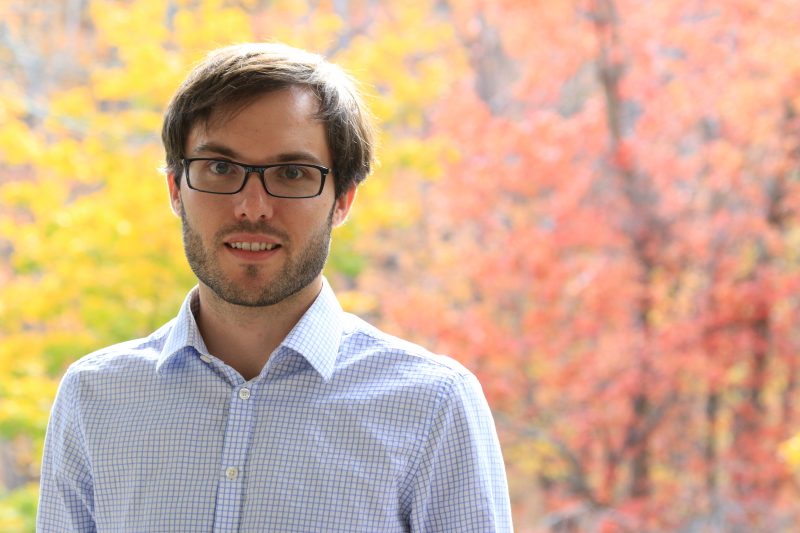Designing Economic Policies to Reduce Inequality John Bovay ’07, an assistant professor in the Department of Agricultural and Resource Economics at the University of Connecticut, focuses on the economics of food and agricultural policy
“As part of the liberal arts curriculum at W&L, the Shepherd Program serves a fundamental role in fostering students’ breadth of learning and intellectual development.”
John Bovay ’07 is an assistant professor in the Department of Agricultural and Resource Economics at the University of Connecticut who worked with inner-city youth in Baltimore during a Shepherd internship in 2005. His research on the economics of food and agricultural policy is motivated by a desire to improve human society and quality of life.
How did the Shepherd Program shape your years at W&L?
Taking Harlan Beckley’s Introduction to Poverty Studies class during my sophomore year greatly influenced my education and career path, as it helped me appreciate the application of economic principles to designing policies that could reduce inequality in our country and around the world. It also allowed me entry into my first roles as a classroom teacher and tutor; my field study that year was as an after-school mentor at Mountain View Elementary School near Buena Vista, and I followed that experience with volunteer work at several different schools in Rockbridge county throughout the rest of my time at W&L. I was also fortunate to serve as a science and math teacher at a summer camp for inner-city youth in Baltimore the summer following sophomore year. Through programs at W&L, I was able to take advantage of a couple of opportunities to explore poverty issues in the developing world, spending a spring break as a volunteer in rural Nicaragua and Spring Term of my junior year in Manaus, Brazil, studying sustainable development. By the time I graduated from W&L with a double major in mathematics and politics and a minor in environmental studies, I was reasonably certain that I would pursue graduate school in economics, which I hoped would allow me to analyze human behavior and design effective policy solutions for improving the environment and quality of life for the world’s poor.
After graduation from W&L, I was fortunate to find a job as a research associate with Abt Associates in Bethesda, Maryland. While I was there, I worked under the guidance of three economists and spent most of my time analyzing the costs and benefits of EPA regulations. Two years later, I entered the Ph.D. program in Agricultural and Resource Economics at the University of California, Davis, near Sacramento. Before I moved to California, I spent six weeks traveling in Ecuador and Peru. Based on my casual observations (and I must emphasize that they were casual), the quality of perishable groceries appeared to be significantly better in Peru than towns near the border in Ecuador; the stores in Peru also resembled American supermarkets in size and appearance. I began to think about the relationship between the economic scale of food producers and distributors and food-quality outcomes, including food safety and food-borne illness. When I arrived in Davis, I spoke with Professor Julian Alston about my experience and research interests, and the next summer began working with Julian and Professor Daniel Sumner on analysis of the trade implications of the U.S. Food Safety Modernization Act.
Eight years later, most of my research continues to be motivated by my desire to analyze incentives and behavior of economic agents (buyers and sellers) in order to inform the design of better policy. After finishing graduate school, I spent two years working at the USDA Economic Research Service, which is much like a think tank or academic institution within the Department of Agriculture. Working there allowed me great access to data and perspectives on policy priorities in Washington, as well as the opportunity to meet and collaborate with many excellent scholars who study the economics of food and agriculture. In my current position, I work closely with stakeholders in Connecticut on the improved marketing of local food products, and I have ongoing research projects that examine the safety of meat sold to the National School Lunch Program, the historical evolution of the food-waste problem, and economic implications of pending federal regulation that will require disclosure of genetically engineered ingredients in many foods. All of these projects are, at least indirectly, inspired by my time at W&L and my experience in the Shepherd Program.
Why is this program important for W&L?
The Shepherd Program is tremendously important as part of the W&L student experience because it encourages students to engage with their community and exposes students to real-world issues that are not typically found in textbooks or discussed in class. Its interdisciplinary approach to the study of poverty brings together students and faculty from different fields, and the Shepherd Consortium and summer internship program allowed me to grow personally as I connected with students from other universities and substantially different backgrounds. Many students come into college with strong opinions and preconceptions about their chosen field of study. As part of the liberal arts curriculum at W&L, the Shepherd Program serves a fundamental role in fostering students’ breadth of learning and intellectual development. I certainly hope that it will continue to thrive in its third decade.
 John Bovay ’07
John Bovay ’07
You must be logged in to post a comment.